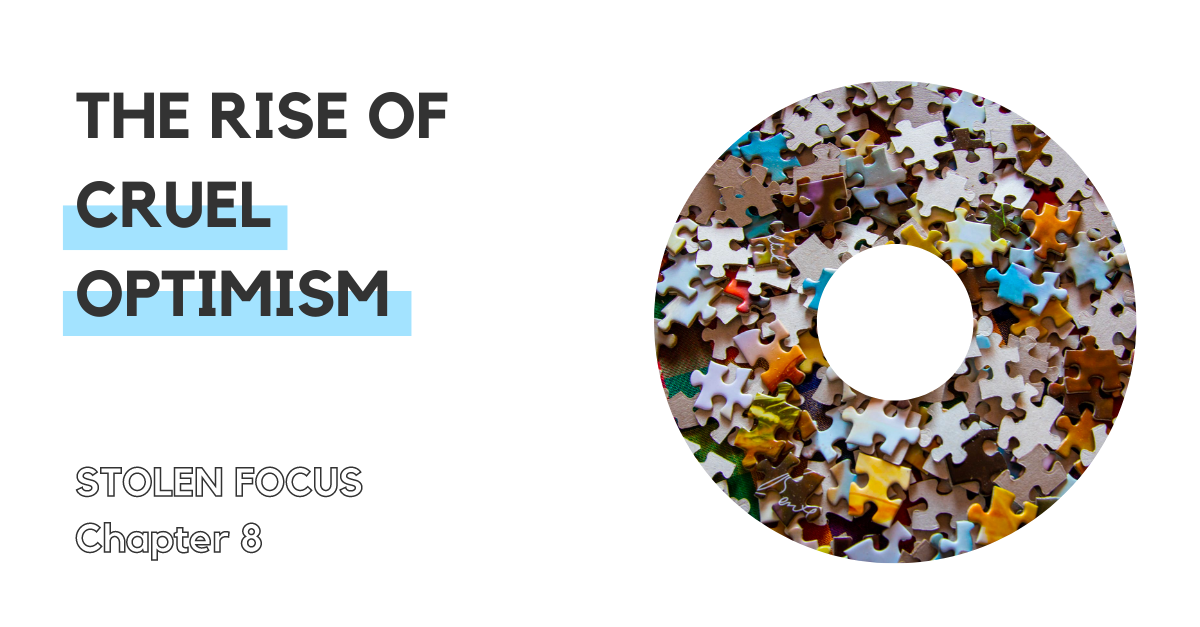‘Digital diets would not solve the attention crisis’ – Stolen Focus, Chapter 8 Notes
Posted on: June 11, 2022
Post Category: Book Notes

About #onepageonepoint
#onepageonepoint aims to summarise new ideas from books on personal and professional development – with (approximately) one point for each page. Read more about this project here.
Today for #onepageonepoint, we have summary notes for Stolen Focus – for chapter 8: ‘Cause 7: The Rise of Cruel Optimism (or: Why Individual Changes are an Important Start, But Not Enough)’.
If you are interested in getting yourself a copy or learn more about the book, click here.
Chapter 8: ‘Cause Seven: The Rise of Cruel Optimism (or: Why Individual Changes are an Important Start, But Not Enough)’
- Nir Eyal, an Israeli-American tech designer, realised after reflecting on his relationship with technological distractions: ‘A childhood is made up of small moments of connection between a child and their parent. If you miss them, you don’t ever get them back.’ (Hari 2022, p. 137).
- Nir took the same course as Tristan (from Chapter 6 and Chapter 7), studying with B.J. Fogg, and worked with similar companies in Silicon Valley.
- Nir suggested that individual changes should be the first line of defence when it comes to dealing with distractions – involving a bit of introspection, to understand ourselves and the reasons why we want use the technology compulsively to begin with.
- Nir suggested that we have internal triggers – uncomfortable emotional states, or moments in our life that trigger these bad habits e.g. getting stressed while writing.
- Nir recommends that our bad habits can be interrupted if we know what the trigger is and create break between the impulse to act and the behaviour itself – using methods like the ten-minute rule, time-boxing your day, deleting apps and scheduling their use, unsubscribing from email lists, etc.
- The logic aligned with Hari’s intention of his digital detox and he tried Nir’s techniques, but he had an uncomfortable feeling – Nir ironically also wrote a hugely successful book called ‘Hooked: How to Build Habit-Forming Products’, about a creating a craving in users and thereby leading them to revisit the product ‘for long periods, ideally for the rest of their lives’.
- Hari clarifies the discomfort he had with Nir’s recommendations: We are taught to think that the solution to limit distractions is to change our individual behaviour (as per Nir’s book ‘Indistractible’) while we are getting distracted by large forces (by technology inspired by Nir’s earlier book ‘Hooked’).
- Cruel optimism is when you have a really big problem and offer people a simplistic individual solution, which, while optimistic, is cruel and blind to deeper causes of the problem. This makes solutions of cruel optimism fail for most people. For example, stress can be (overlooked and) identified as a failure to quiet down our rattling thoughts and be mindful that can be overcome with meditation, but studies have shown major causes of stress include lack of health insurance, constant threat of lay-offs, long working hours, etc.
- Cruel optimism seems kind and optimistic but has an ugly after-effect – it teaches people to think differently about their problem and they will be fine, and that a failure to overcome the problem is the individual’s failing.
- Essentially, not everyone will have a clear-cut solution like Nir’s to manage their distractions – since cruel optimism ‘takes exceptional cases, usually achieved in exceptional circumstances, and acts as if they can be commonplace’ (Hari 2022, p. 145). Hari illustrates this with a few examples, one being: ‘It’s easier to find serenity through meditation when you haven’t just lost your job and you aren’t wondering how you’re going to avoid being evicted next Tuesday’ (Hari 2022, p. 145).
- Cruel optimism takes for granted that we can’t change the system, and it forces us to focus on changing ourselves.
- Hence, the solution is not simple. There needs to be more than individual efforts to overcome distraction; there needs to be ‘authentic optimism’ to acknowledge the other barriers that are present.
- Hari quotes Tristan: ‘You can try having self-control, but there are a thousand engineers on the other side of the screen working against you’ (Hari 2022, p. 148).
If you are interested in getting yourself a copy or learn more about the book, click here.
Interested in reading more? See my notes for Chapter 9.

About the author
Jason Khu is the creator of Data & Development Deep Dives and currently a Data Analyst at Quantium.